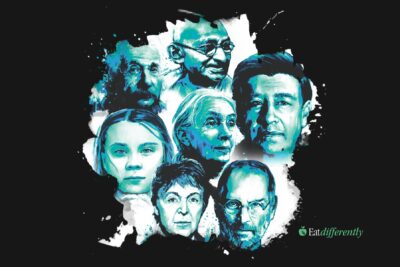By Joseph Stratton
Masculinity is a complex concept, one that is neither well enough understood nor adequately represented in our society. It is, often with good reason, defined by terms like “toxic masculinity” and is represented by the so-called “macho” actions of certain men, men who do not embody the true characteristics of what it means to be masculine. But this need not be the case. With a sea change in society’s understanding of masculinity, as well as a shift in the ways men understand themselves, I believe the situation can change.
I recently spoke to Anthony Mullally, ex-rugby league champion turned wellness coach, and found out what masculinity meant to him. My main takeaway was that genuine masculinity lies in demonstrating care and compassion, and utilising strength and power to create positive and judgement-free environments for oneself and others.
I also believe that veganism, among other interventions, can be part of a powerful and healthy pathway. It’s a way men can start to embody positive traits of masculinity and express them through their everyday choices and actions.
Understanding Masculinity
As people, we embody characteristics of both the masculine and feminine, regardless of gender, so it is important to recognise these terms as fluid, rather than rigid. Doing this allows us to better understand and analyse masculine traits and separate the healthy and the toxic.
Unfortunately, many people’s current understanding of masculinity is that of the caveman, i.e. one cannot be masculine without embodying traits such as physical strength, power, ability to dominate others, hunt and / or eat living beings, and take what is wanted without fear of consequence.
Anthony told me, however, that, while those characteristics of the cavemen may have been useful for survival at one point, they are not applicable in the modern world. Men often mistake strength for how it can be used over others, or how physically dominant we can be.
Toxic Masculinity and the Role of Toxic Advertising
Toxic masculinity is a common term and one that is often used with good reason. Numerous individuals in the world engage in harmful actions, and it is evident that their motivation stems from a toxic interpretation of masculinity.
However, Anthony’s opinion is that we should not be branding masculinity as toxic, but more that there are toxic traits exhibited by men that tar masculinity with a toxic brush. Masculinity is where it is because of societal issues, largely caused and repeated by men, but how are we supposed to look forward to a better future, if masculinity becomes a toxic concept by default? Tackling this issue is about redefining masculinity for men, and showing how to embody the positive aspects of masculinity like compassion, love, care, and protecting the vulnerable.
This is a very complex issue and one that I am not wholly qualified to unpack – but what I do know, is that not enough blame has been laid with corporations, who irresponsibly have been allowed to advertise harmful products, in a way that plays into all the negative tropes of masculinity.
Meat and dairy, among other products, have long been aggressively marketed towards men, with ads throughout the 1990s and early 2000s being shockingly sexualized. Fast food companies did everything they could to place the macho, masculine man at the centre of the world and the female as an object, who is to be consumed in the same casual manner as the burgers or hot dogs.
One notable example is the “Manly Men” ad campaign by the fast-food chain Carl’s Jr. In these commercials, the company portrays rugged, masculine men devouring their meaty burgers, or women presenting the products to men, in exaggerated and often sexually suggestive ways. As suggested in this article, this kind of campaign is terrible for both women and men. They feed into the idea of caveman masculinity, which convinces men that they need and deserve to be dominant, and to take whatever they want, without any consequence.
For a better understanding, I’d recommend watching Simon Amstel’s Carnage, a very informative, watchable, and entertaining film.
The Consequences of Toxic Traits of Masculinity

I believe that toxic traits of masculinity have played a part in leading us down the path of over-consumption, domination of other species, and harm towards women and LGBTQIA+ groups. It has also led us to lose our connection with the natural world and spurred a silent crisis in men’s mental health.
Major corporations, which have taken everything they can from the planet in order to make a profit, have traditionally been led by men who embody toxic traits of masculinity. And this is true of Big Ag, which promotes meat-heavy diets to men that are causing great harm to the planet as well as to men’s health.
Men are also hurting themselves by embodying toxic traits of masculinity. By prioritising strength and dominance, we close ourselves off to support networks and forget to share how we are really feeling with others. Often, the consequences such as depression, self-harm, and even suicide, come before men even recognise what is happening.
I cannot speak to the experience of women or LGBTQIA+ people, but as a cis-gendered man, I know that men must do more, must communicate more effectively with each other about what acceptable behaviour looks like, and be a supporting voice for their female friends, family, and colleagues.
As men, it’s time to take a step back and analyse how our masculinity might be affecting our own lives, the lives of others, and the planet. Ditching meat is a great place to start. Trust me, or rather, trust Anthony Mullally, it won’t make you any less of a “man”.
Meat and Masculinity
To understand the relationship between masculinity (in its traditional, caveman sense) and meat, we need to go back a little.
Before capitalism, food was just food, grown locally to the people that ate it, and eaten as a means of enjoying ourselves and staying alive. But like everything, it became just another part of our commercialised world, a commodity that could make people a lot of money. All of a sudden food was marketed to us, just like household goods or clothes.
Meat and dairy companies realised that by sexualising their advertising, and placing problematic traits of masculinity at the centre of their marketing, they could sell more products to men. This is likely to have played a role in men eating a shocking 57% more meat than women. Not because they need to, but because they feel like they should, and that it is fitting to do so to be strong, macho, and dominant. Why? Because meat companies have been embedding this idea in men’s heads for decades.
Masculinity and Health
Men often think of their health as only physical. Many men don’t even know they are experiencing mental health issues as they are happening, and this is dangerous. Unchecked mental health issues can lead to negative decision-making, self-harm, and even suicide. Although men have lower incidences of depression overall than women, in the UK they account for 77 per cent of all deaths from suicide.
There is a lack of willingness to seek medical attention and a lack of open, honest communication between men about how they feel. Men are told from a young age that masculinity means showing strength (“boys don’t cry”) and that showing your pain or suffering is weak, when it’s clear that sharing your feelings, having strong relationships and support networks, and taking care of your physical health all can support good mental health. For this reason, it’s more important than ever that we challenge men’s conventional, outdated understanding of masculinity.
Anthony’s take is that health is not just physical, it encompasses mind, body, and spirit, and only when we begin to nurture all of these aspects, can we begin to break down the masculine barriers and build the strongest foundation of masculine health we can. Whilst it is not a replacement for mental health interventions such as therapy, going vegan is a wonderful way to start this journey.
Veganism and Masculinity
It would be a stretch to say that eating meat is at the heart of all the problems with masculinity in our society, but I believe it’s had a much bigger impact than most people think. Veganism, among other interventions, can lead us to better understand the positive traits of masculinity such as compassion to others, cultivation of our physical and mental health, and protection of those more vulnerable than ourselves.
It’s clear that veganism encourages positive physical health – Anthony is a shining example of this. But traditional masculinity has prevented men from seeking medical advice while targeted advertising from meat companies has led to men eating foods that increase their risk of chronic disease. Veganism puts us back in touch with our health and breaks down the masculine barriers we have put up in taking care of ourselves.
Veganism also encourages us to connect more with nature, which is proven to improve mental health. It shows us that we as humans are not the centre of the planet and that all living things deserve to be, and thrive here. It also opens us up to having compassion for all living beings, and places them as equals, making it easier to extend that same compassion to ourselves.
The conventional masculine we see displayed by so many men is challenged by veganism’s principles and I believe men need this intervention now more than ever.
Useful Resources
If you are struggling with your mental health and want to try talking to somebody, please seek professional help. This can be done through your doctor while platforms like Better Help offer affordable therapy options that are completely free of judgement and easy to access.
If you have read this and want to try veganism, GenV’s vegan challenges are a great place to start. Earthling Ed also produces excellent content and often touches on the relationship between meat and masculinity.
Groups in the UK like Talk Club, offer the opportunity to talk to other men and often engage in a physical activity. Men’s talking groups are becoming more and more popular, so keep on the lookout for one local to you.
And Anthony himself runs wellness retreats where men can connect, immerse themselves in nature, delve into growth practices, foster new brotherhoods and reconnect to their most authentic selves.
Conclusion
Masculinity is complex and as a society, we need to recognise where men are failing and why. But instead of judging individuals and ourselves, we need to encourage the embodiment of positive masculine traits like compassion, and protection of the voiceless and vulnerable. Embracing veganism can be a transformative step in this process. Showing compassion to animals who are being dominated by humans, can hold a valuable mirror up to ourselves and show us how to extend that compassion to ourselves, other humans, and the planet. Veganism also provides a chance to start embracing our health, too, and greatly reduces men’s risk of chronic diseases and mental health issues.
My main takeaway from all of this though, would be that ditching meat is not a sign of weakness but an opportunity to embody a healthier and more compassionate form of masculinity, that is better for everyone.

Joe Stratton is the UK Campaign Manager for GenV. In his spare time, he enjoys skateboarding, live music, and good beer. He also volunteers for Talk Club, a men’s mental health talking group.




